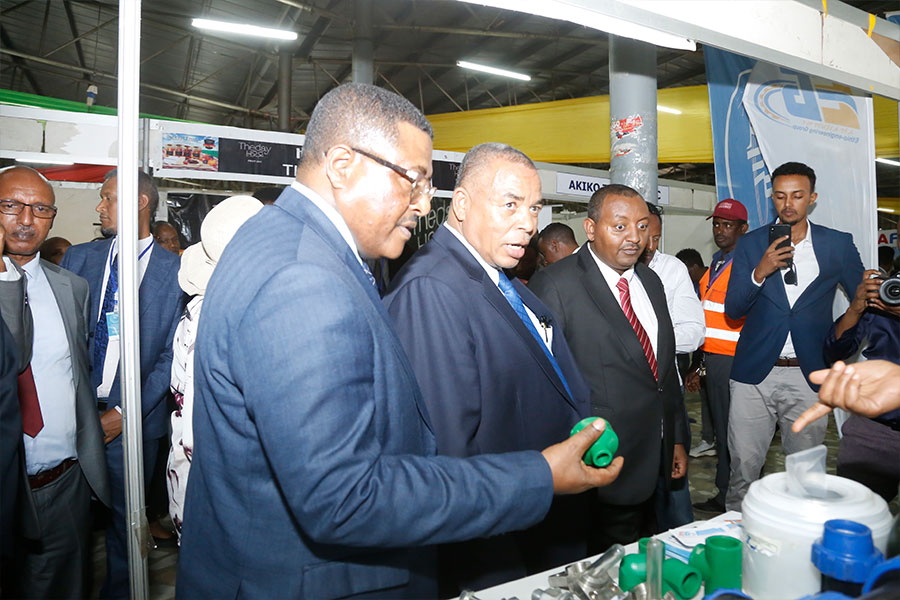
Sunday with Eden | Feb 29,2020
A little over six-dozen companies are vying to buy 2,400 freight trucks with a credit facility from the Commercial Bank of Ethiopia (CBE). The companies will raise 30pc of the value, while the remaining will be covered by a loan secured through the central bank's guarantee.
The Federal Transport Authority (FTA) in collaboration with the National Bank of Ethiopia (NBE)initiated the process with the hope of easing problems in the logistics sector brought on by a shortage of trucks. With the new initiative, the private sector will procure the trucks through a supply credit modality approved by the National Logistics Council, a 10-member body in charge of making high-level policy decisions related to the transport sector.
For the procurement of the trucks, the FTA floated a tender on January 12, 2021, subsequent to a recommendation of a study it conducted on transportation impediments. The modality requires prospective companies to put up an initial deposit of with the remaining to be financed by a credit facility.
The buyers of the trucks will pay the remaining 70pc to the Commercial Bank within two years.
The buyers are expected to find the truck manufacturers or suppliers themselves and select the models and prices as well as the linkage between the potential companies that will be delivering the vehicles. The trucks, expected to be delivered to the country within 60 to 120 days, have to meet the specifications outlined in the bid document including the payload and carrying capacity.
Over 200 companies bought the bid documents, and 76 of them have submitted their proposals. The review process is expected to be finalised within the coming weeks, according to Abdulber Shemsu, deputy director at the Authority, which is overseeing the procurement.
Out of the total, 400 will be fuel trucks. After the winners are selected, they will get the loan and enter into a contractual agreement with fuel truck suppliers or manufacturers. Following the procurement of the fuel trucks, transporters will negotiate with fuel supply companies.
The companies will then pay the transporters for every trip as per the range of payments to be set by the Ministry of Transport, according to Tadesse Tilahun, CEO of National Oil Company (NOC).
Serkalem Gebrekristos (PhD), an expert with two decades of experience in petroleum supply, says that procuring the trucks is not enough to solve the fuel shortage in the country.
"These fuel trucks will affect the fuel demand and supply chain positively," he said, "but unless there is a proper projection and plan for demand, it can't be a permanent solution."
The fuel trucks must be consistently replaced on top of the annual 10pc to 15pc fuel consumption rise, according to Serkalem.
The financial costs associated with the shortage of freight trucks in the country are numerous, and this is expected to alleviate the problems, albeit only as a short-term solution, according to Elizabeth Getahun, president of the Ethiopian Freight Forwarding & Shipping Agents Association. She added that this is on top of the environmental costs that come along with old and overused trucks.
Issues like mounting demurrage and warehouse costs are among the problems, according to Elizabeth, offering that the shortage also results in an inflated price for transportation costs.
The Association, a member of the National Logistics Council, also played a role in bringing this to the attention of the Council in a bid to find solutions, according to her.
"We need to look at other long-term solutions as well, since trucks are worn down over time and a certain amount need to be replaced by new ones every year," she said.
Alongside the railroad facilities, freight trucks also play an important role in the landlocked country, according to Engida Tadie, a lecturer at the Department of Urban Transport Management at Kotebe Metropolitan University.
"These types of solutions need to be sustainable," he said. "There needs to be a systemic structure that can be followed regardless of the country's political tone."
Railroad transport, with its ability to carry more cargo and deliver within a shorter time, should be further strengthened as an alternative solution, according to Engida.
Be that as it may, encouraging the private sector to get involved in bridging gaps is essential, according to the expert.
"This can be done by providing tax and duty breaks, as well as financial support," said Engida.
PUBLISHED ON
Feb 27,2021 [ VOL
21 , NO
1087]

Sunday with Eden | Feb 29,2020

Radar | Sep 28,2019

Radar | Jun 04,2022

Radar | Apr 24,2023

Radar | Aug 18,2024

Advertorials | Dec 06,2023

Radar | Nov 20,2021

Verbatim | Oct 28,2023

Radar | Apr 12,2020

Commentaries | Feb 27,2021

Dec 22 , 2024 . By TIZITA SHEWAFERAW
Charged with transforming colossal state-owned enterprises into modern and competitiv...

Aug 18 , 2024 . By AKSAH ITALO
Although predictable Yonas Zerihun's job in the ride-hailing service is not immune to...

Jul 28 , 2024 . By TIZITA SHEWAFERAW
Unhabitual, perhaps too many, Samuel Gebreyohannes, 38, used to occasionally enjoy a couple of beers at breakfast. However, he recently swit...

Jul 13 , 2024 . By AKSAH ITALO
Investors who rely on tractors, trucks, and field vehicles for commuting, transporting commodities, and f...

Oct 11 , 2025
Ladislas Farago, a roving Associated Press (AP) correspondent, arrived in Ethiopia in...

Oct 4 , 2025
Eyob Tekalegn (PhD) had been in the Governor's chair for only weeks when, on Septembe...

Sep 27 , 2025
Four years into an experiment with “shock therapy” in education, the national moo...

Sep 20 , 2025
Getachew Reda's return to the national stage was always going to stir attention. Once...